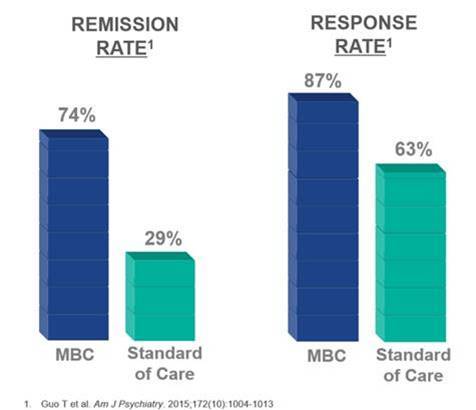Measurement Based Care (MBC) involves using Patient-Reported Outcome Scales (PROS) to quantify the presence and severity of depressive symptoms/adverse events and measure functional outcomes. Patients and providers using PROS are better able to track symptoms, which facilitates more timely medication-related adjustments and improvements. Clinician-rated symptom scales which are longer and therefore are impractical to use in clinical practice. Incorporation of PROS has been shown to improve patient outcomes in MDD. The bar graph below is an example.
PROS with documented psychometric properties of reliability and validity include2
- Quick Inventory of Depression Symptomatology – Self-Report (QIDS-SR)
http://narr.bmap.ucla.edu/docs/QIDS-SREnglish16item.pdf
- Patient Health Questionnaire-9 (PHQ-9)
https://www.med.umich.edu/1info/FHP/practiceguides/depress/phq-9.pdf
- Clinically Useful Depression Outcome Scale (CUDOS)
https://outcometracker.org/library/CUDOS.pdf
The use of PROS is accepted by patients and scales are easily accessible3
- 98% no burden/minimally burdensome to complete
- 94% willing to complete at every visit
If you haven’t tried using one of the above Patient Rated Outcome Scales (PROS), how about briefly reviewing them and pick one to use with a few patients during the next few weeks? You will hear from us again in a month to hear about your experience and steps you have taken to incorporate PROS into your practice. The links to the scales are provided above.
References
1 Guo, et. al. (2015). Measurement-Based Care Versus Standard Care for Major Depression: A Randomized Controlled Trial with Blind Raters. American Journal of Psychiatry, 172 (10), p. 1004-13.
2,3 Zimmerman M, et al. (2008). A clinically useful depression outcome scale. Comprehensive Psychiatry. 2008 (49), p.131-40.


